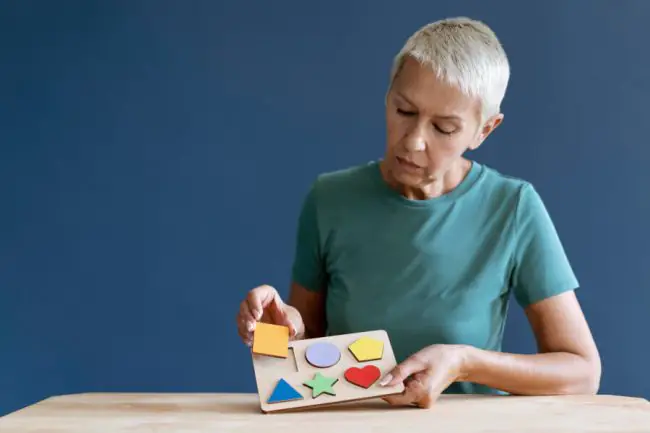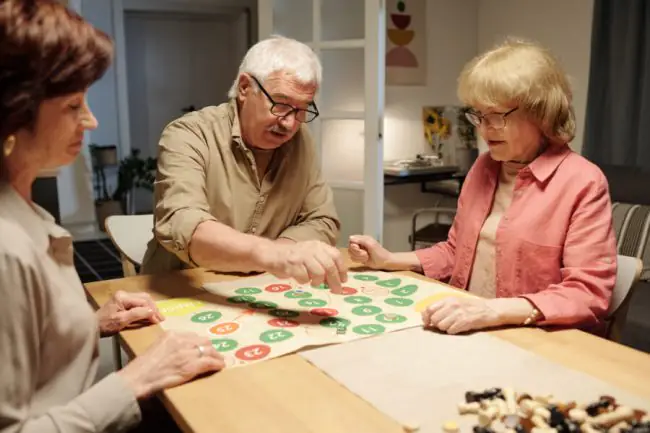As we age, maintaining cognitive health becomes increasingly important, especially for seniors dealing with dementia. Memory exercises can play a significant role in managing dementia symptoms and enhancing cognitive function.
Let’s explore five effective memory exercises designed to provide relief and improve brain health for seniors.
The Impact of Cognitive Exercises on Dementia Relief
Memory exercises are more than just mental games; they can have a profound impact on managing dementia symptoms. Engaging in regular cognitive activities can help stimulate brain function, slow cognitive decline, and improve overall mental well-being.
These exercises work by challenging the brain, enhancing neural connections, and promoting mental agility.
Benefits of Memory Exercises for Seniors
Memory exercises offer several benefits for seniors, including:
- Improved Cognitive Function: Regular mental stimulation can enhance memory, attention, and problem-solving skills.
- Delayed Cognitive Decline: Engaging in brain exercises can slow the progression of dementia and other cognitive disorders.
- Increased Quality of Life: Mental stimulation can boost mood and provide a sense of accomplishment, contributing to a better quality of life.
Types of Memory Exercises
Physical Exercises to Enhance Memory in Older Adults
Physical activity is not just good for the body; it’s also beneficial for the brain. Exercises that combine physical movement with mental tasks can enhance memory and cognitive function.
- Walking with a Purpose: Take a walk and try to remember specific details about your route, such as landmarks or street names.
- Dance Classes: Dancing involves both physical movement and mental coordination, which can help improve memory and cognitive skills.
Mental Exercises to Boost Cognitive Skills and Memory Retention
Mental exercises challenge the brain and help strengthen cognitive abilities. Incorporating these activities into your daily routine can provide significant benefits.
- Puzzles and Sudoku: These activities enhance problem-solving skills and improve memory retention.
- Reading and Discussing: Reading books or articles and discussing them with others can stimulate mental processes and enhance comprehension and memory.
Social Exercises for Seniors
Social interaction is crucial for mental health and cognitive function. Engaging in social activities can provide mental stimulation and emotional support.
- Group Games: Participate in group games like trivia or card games that require recalling information and interacting with others.
- Storytelling: Sharing personal stories or memories with friends and family can stimulate memory and provide social engagement.
Learning New Skills
Whether it’s picking up a new hobby like knitting or learning a new language, acquiring new skills can improve cognitive flexibility and memory. It’s an excellent way to keep the brain engaged and stimulated.
Jigsaw Puzzles
Working on puzzles requires visual memory and spatial awareness, which helps seniors engage multiple brain areas. Completing a jigsaw puzzle also offers a sense of accomplishment and can reduce stress.
Memory Games for Seniors
Board Games to Improve Memory Function
Board games can be a fun and effective way to enhance memory skills. Look for games designed to challenge cognitive abilities and memory.
- Memory Match Games: Games where players match pairs of cards or images can help improve visual memory.
- Crossword Puzzles: These puzzles challenge verbal memory and cognitive skills, making them great for seniors.
Memory Games Tailored for Seniors
Specialized memory games can be beneficial for seniors with dementia. These games are designed to be engaging and suitable for various cognitive levels.
- Custom Memory Books: Books with familiar images and names can help seniors recall important people and events.
- Interactive Apps: Apps designed for cognitive training can offer interactive and adaptive memory exercises that adjust to the user’s abilities.
Creating a Memory Exercise Routine
A consistent routine can make memory exercises more effective. Incorporate different types of exercises into a daily schedule to keep the brain engaged.
- Set a Schedule: Dedicate specific times each day for memory exercises, such as morning puzzles or evening storytelling sessions.
- Mix It Up: Include a variety of exercises to challenge different cognitive skills and keep the routine interesting.
Tips for Active Participation in Memory Exercises
Motivating seniors to participate in memory exercises can enhance their effectiveness. Here are some tips to encourage engagement:
- Make It Fun: Choose activities that are enjoyable and stimulating to keep interest high.
- Involve Others: Engage family members or friends in memory exercises to provide social interaction and support.
- Track Progress: Celebrate achievements and progress to boost motivation and confidence.
Innovative Approaches for a Memory Improvement
Exploring New Memory Exercises for Seniors
Innovation in memory exercises can offer fresh and engaging ways to challenge the brain. Consider incorporating creative activities into your routine.
- Art Therapy: Engaging in creative activities like painting or drawing can stimulate cognitive function and provide emotional expression.
- Music Therapy: Listening to or playing music can improve memory and mood, and also provide cognitive stimulation.
Using Technology Through Interactive Games and Apps
Technology offers various tools for enhancing memory and cognitive function. Interactive games and apps can provide personalized and engaging exercises.
- Memory Apps: Use apps designed for cognitive training, which offer exercises tailored to different levels of ability.
- Virtual Reality: Explore virtual reality experiences that provide immersive cognitive challenges and memory exercises.
Conclusion
Memory exercises are a powerful tool for managing dementia symptoms and improving cognitive function in seniors. By incorporating a variety of physical, mental, and social exercises into a daily routine, seniors can enhance their memory and overall brain health. Embrace innovative approaches and make memory exercises a fun and engaging part of daily life for better cognitive well-being.
FAQs
What is dementia?
Dementia is a group of symptoms associated with a decline in cognitive function, affecting memory, thinking, and reasoning. It includes various types, such as Alzheimer’s disease, and can impact daily living.
What are the best memory games for seniors?
Some of the best memory games for seniors include memory match games, crossword puzzles, and interactive apps designed for cognitive training.
What Are Brain Exercises?
Brain exercises are activities designed to stimulate cognitive function, improve memory, and enhance mental agility. They can include puzzles, reading, and memory games.
How to Take Action to Reduce Dementia Risk
To reduce dementia risk, engage in regular physical and mental exercises, maintain a healthy diet, stay socially active, and manage chronic conditions. Consulting with healthcare professionals for personalized advice can also be beneficial.








